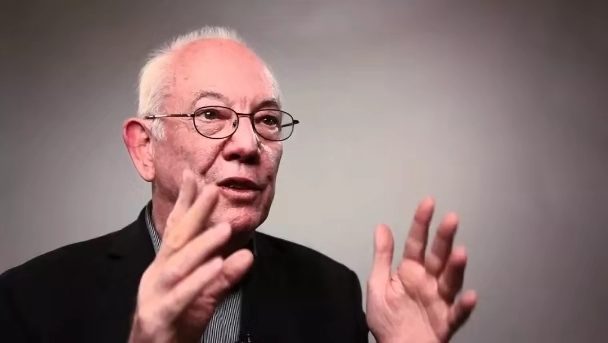Interview with famous economist W. Brian Arthur: historic changes are taking place, blockchain will enter everyday life
In this issue of spark interviews, we are fortunate to talk to W. Brian Arthur, the father of complex economics. He shared with us some of his views on Bitcoin and the blockchain, and shared some insights about financial market forecasts with us.
Guest introduction

W. Brian Arthur:
- Viewpoint | Say goodbye to traffic and funds, is there still value in digital currency?
- How blockchain technology can improve the lives of 22 hospitals
- Viewpoint | If these three technologies improve, blockchain technology will be more widely used
A well-known economist, an external professor at the Santa Fe Institute, and a visiting researcher at the System Science Laboratory at the Palo Alto Research Center. In the 1980s, Arthur was invited by the Nobel Prize winner Kenneth Arrow to the newly established Santa Fe Institute. At the Santa Fe Institute, Arthur combines the theory of complex systems with economics research, gradually forming the concept of “complexity economics” and winning the Schumpeter Prize in 1990 with the theory of increasing returns. .
As a proponent of the theory of increasing returns, Arthur created a new model of interdisciplinary research on economics and complex systems. As the first scholar of the Santa Fe Institute to study complexity, Arthur was one of the founders of the field of complexity science. In 2008, he won the first Lagrange Prize in the field of complexity science.
Q: What is your opinion on Bitcoin? Will it be a disruptive technology like the Internet of 2001?
A: The first thing to note is that I don't know much about Bitcoin. But I think that the emergence of Bitcoin is an emerging phenomenon. We don't know how he appeared. His appearance is beyond the control of the national government . Therefore, whether China or the United States likes Bitcoin, Bitcoin will exist.
Bitcoin is spontaneously generated. It is international and not widely accepted. In our cognitive radar, it has a bit of privacy. But no matter what country or government wants to do anything with Bitcoin, it will exist. For blockchain, bitcoin is a representation of its technology in trading. In addition, no one I see in Europe, the United States, or China knows how to deal with the threats they are looming.
The role of the blockchain is different for everyone. Everyone knows that the blockchain gives them another way to record their business, which can make trading a lot easier. For example, I heard last week that if you get a very precious painting from someone, you can now record these transactions on the blockchain. Any exchange of values on the blockchain will make the blockchain important.
Moreover, banks are not quite sure what to do about it. Last year, I had a conversation with a major international commercial bank. They said that we know that the blockchain is here, but we don't know what to do about it.
So what happens next?
I think that everything will be recorded in some way by a certain block, which is completely inevitable. So the blockchain will enter everyday life.
We are actually in a huge transformation . Banks, insurance, shipping, trade, oil, transportation, oil transportation, commercial banks, retail banking, all of these companies will have to accept blockchain, and may also include bitcoin, but mainly blockchain and artificial intelligence. They are all in the middle of change now, and of course, they may be at the beginning of change .
When I talked to people in these industries, they told me that they would inevitably become a fintech company in 10 or 15 years, but they don't know how to do this.
In fact, this is like an intermediary. If you solve the technology of blockchain technology and financial technology, you can sell these services to big companies like banks.
But big companies think that digitization is completely inevitable, and they want this change. But they don't know what to do. It's a bit like going through the Red Sea. They can stop by the water and try to reach their feet in the water, but they don't know they can swim. Therefore, this will be a major historic change.
Q: Bitcoin appeared during the 2008 financial crisis. If the next financial crisis is approaching, will this be another opportunity for Bitcoin?
A: If I go to the United States, I think no one in the people I know knows when the next financial crisis will occur. If they don't know what will happen, everyone will put the money in the stock market. No one can say with certainty that the stock market is about to collapse. I think this matter is not that important.
More importantly, we are in an era – every industry is facing historical changes, as is the United States, Europe and even China. Every traditional industry is changing, and it is digital. For example, the medical industry is also beginning to pay attention to what we will look like in 15 years. In the transportation logistics industry, after 10 to 15 years, trucks in China or Australia are likely to transport goods across countries. All these changes are happening. We are only at the beginning . Q: In a complex system, a typical case is the difficulty of predicting the weather. Actually, in the past 30 years, although it is very difficult, it is more and more accurate. I don't know what you think about it.
A: The difficulty in predicting the weather is that the weather system is highly nonlinear, and even the basic physical rules behind it are chaotic.
If there are some small deviations at the beginning of the forecast, such as a difference of two to three degrees Celsius in the readings, it may mean that the weather after two weeks is very different. Looking at this problem from a more macro perspective, we will find that there is also a revolution in the field of meteorology: sensors, thermometers and pressure gauges are everywhere. In 2000, there were not many weather stations. Now, we may have hundreds of thousands or even millions of such sensors. They are found throughout sea level, the Arctic, and even some remote areas of China or Siberia.
All the sensors bring us a lot of data. Around 2012, we all started talking about big data. Although we got a lot of data, at that time, we didn't know what to do. In comparison, our computers and CPUs are faster. We also have deep learning node networks and algorithms. Therefore, the combination of more efficient data processing capabilities and better algorithms allows us to predict better. This will change everything, but it is still not perfect.
We are at the forefront of a new field that is driven by sensors or technology, giving us a lot of data, faster calculations and better algorithms. This will change everything. Q: We can better predict the weather through the technical revolution just mentioned. Can we better predict the market, or do we have already done it?
A: This is a question worth $6.4 billion. My answer is yes.
We predict that anything will be better than before, but our predictions cannot be perfect. Because if you have a very good forecast, then you will invest based on this forecast, but in turn, this will change your forecast. So, I do think that the forecast is getting better and better. Moreover, it also began to use natural language processing to read text. I think this prediction can accept cognitive testing. But I think it is far from perfect. For example, there is a man named Jamal who was murdered in Turkey, or in places like Istanbul, Saudi Arabia, and James. Such emergencies are likely to change everyone’s attitude towards Saudi Arabia, and oil prices may be affected. This unpredictable thing will always happen.
Moreover, if you can predict well, others can predict. This will also have an impact on the predicted outcome. I think all predictions will be more and more accurate, including predictions about health, who will have a heart attack, and so on. But it is always not perfect.
Q: You think the economic system is a complex system. Is it also a power system? If it is a power system, it means that it must have a dynamic equation. What do you think is the most basic dynamic equation?
A: This is a very good question and a very fundamental one. After leaving here, I may use the next six months to think about this issue.
In order to view the economy as a standard system, neoclassical economists tend to see the economy as a balanced system, all of which are balanced, just like the interaction forces in spider webs, and ultimately Balanced. So they are liberals who advocate equality. Therefore, the concept of mainstream economics is equilibrium. Of course, there may be some imbalances in the system, but in the end it will return to equilibrium. Just like when you touch a spider web, it will quickly return to its original shape. But the team that developed the complex economics with me did not agree with this concept. We try to point out that the economy is not necessarily balanced.
Therefore, if the economy is seen as unbalanced, we will not regard it as a machine, or like a spider web, or a balanced system. We see it as an ecosystem in which individuals have different beliefs and behaviors. You don't always know who did what, you don't know how good your technology will be, and you don't know how the government will respond.
In Silicon Valley, we have a variety of ideas, and the government will not respond until three years later. Similar things may happen in China.
Therefore, in such an unbalanced system, you know limited, always exploring an environment with many participants. And those participants are also trying to find a way to do something. Everyone seems to be exploring in the dark. In this, there may be people who do well, and some people can make money from others, and so on. Therefore , fundamentally speaking, the economy is regarded as a complex system, which is regarded as an ecosystem.
Back to your question, there are many dynamic systems that can be described by equations, but not necessarily by algorithms. Because the algorithm is mainly derived from the equalization system. Therefore, these equations can be easily unfolded, just as the Lorentz equation is correct.
But in the economy, there are many things that will be triggered together. If this happens, the central bank will intervene and re-stabilize the currency. Therefore, not all dynamic systems can be written as equations.
From the perspective of complexity economics, we tend to think of the economy as the calculation itself. It's like an ecology with many participants and different strategies. You can roughly describe it as a computational process with many different factors.
This calculation is very complicated for the entire economy. But if you only model a certain oil trade or other transactions, it is likely to be modeled by algorithms.
Question: ABM is an important method for studying complex theory. If ABM cannot fully simulate the interaction of people in society, is it feasible to use ABM to predict systemic risks in finance?
A: We have run some of the earliest individual-based models. At the Santa Fe Institute, we built a model based on the stock market 31 years ago. In my experience, it is not difficult to build an individual for this model. The key is to find out who is the subject and which party they represent (perhaps a bank or financial institution, an insurance company). Each subject is a participant, and then each subject is calculated by the target object library, which may be Python or C++.
Stefan Turner, he has a paper that I think is scientific, but there are systemic risks. This is a very large subject model of the Austrian Academy.
One important thing is that systemic risk stems from the interrelationships between financial institutions. This is because banks may hold debts to each other. In other words, if your bank is making money, but another bank has encountered problems, it may also cause your bank to get into trouble. The problems that these individuals may encounter are aggregated and referred to as systemic risks.
In this case, you can build a realistic financial institution model to find out how they are bound to each other. For example, when a bank's operations are in trouble, how do you pass these risks to other affiliated banks, and even further, spread this risk to the entire financial system?
This is actually what happened in the financial system in 2008. AIG and Lehman Brothers and other big banks were in trouble, and banks with close ties to them were in trouble, and then the entire financial system collapsed, and the US government had to come in to support the country's financial system.
Stephen Turner’s article argues that some financial companies are dangerous, and once they collapse in the system, many countries’ economies will collapse.
Question: In complex economics, the theory of increasing returns and path dependence suggests that economic development is determined by the interaction of various economic forces and random “historical events”, and this result is not necessarily optimal and cannot be completely Predicted; so what should we do for researchers?
A: I will give you an example. In 1500, Italy was one of the most advanced countries in the world. Of course, around 1400 years. They have some of the best scientists in the world, such as Galileo or a similar researcher. The economic development in northern and southern Italy is similar. The south is Naples, and the south is Rome. In the north there are Florence and Siena, Milan and other regions.
It turns out that in the economic development, in order to surpass or keep up with the development of better regions to become more prosperous, workers in this region will learn more skills, thus attracting more companies and investment into the region. Historically, southern Italy has developed very well, and it has grown better and better over a sustained period of time. So if the southern part of Italy develops first, it will develop better and better, or if the northern part develops the same situation, it will develop better and better. This is what happened in history. From the 1950s to 2000, northern Italy was spread across the automotive and fashion industries. As a result, Milan's tourism and other types of departments have also developed. These examples are consistent with your problems. You can say that they are all It is historically dependent, dependent on various minor events, and even unique to Italian development. But if a series of different things happen in Italian history, perhaps the development of southern Italy will dominate.
What I want to say is that if a region is leading the development, or a company, or a technology, it will gain more advantages on this basis and keep itself in a leading position. But we can't predict in advance what caused this result. This result is not even the best result.
Source: X-Order
We will continue to update Blocking; if you have any questions or suggestions, please contact us!
Was this article helpful?
93 out of 132 found this helpful
Related articles
- Explore: Blocking and expansion of blockchains
- Analysis: The DAO governance trend is gradually rising, and the blockchain needs no braking mechanism?
- The Bank of International Settlements economists propose a new method for financial market monitoring based on DLT
- Weizhong Bank issued a “good” social governance framework and used blockchain for social governance
- Who can take the lead in breaking the exchange contract?
- Viewpoint | Why is the Chinese central bank eager to issue its own digital currency?
- Experts argued: Libra turned out, what impact will the central bank's digital currency have?






